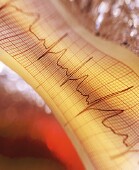Cardiac screening not linked to improved patient outcomes; is associated with potential harms
TUESDAY, March 17, 2015 (HealthDay News) — Cardiac screening with resting or stress electrocardiography, stress echocardiography, or myocardial perfusion imaging is not recommended for low-risk adults, according to a clinical guideline from the American College of Physicians published in the March 17 issue of the Annals of Internal Medicine.
Roger Chou, M.D., from the Oregon Health & Science University in Portland, and colleagues conducted a narrative review on the yield, benefits, and harms of cardiac screening in low-risk adults.
The authors note that cardiac screening has not been associated with improved patient outcomes. Furthermore, it has been associated with potential harms due to false-positive results that lead to unnecessary testing and procedures. For adults at low risk for coronary heart disease, cardiac screening is likely to be particularly inefficient given the low prevalence and predictive values of testing in this population, and the low likelihood that positive findings will impact management. Within a low-risk population, clinicians should focus on strategies for treating modifiable risk factors and encouraging healthy levels of exercise.
“Clinicians should not screen for cardiac disease in asymptomatic, low-risk adults with resting or stress electrocardiography, stress echocardiography, or stress myocardial perfusion imaging,” the authors write.
Full Text
Copyright © 2015 HealthDay. All rights reserved.








